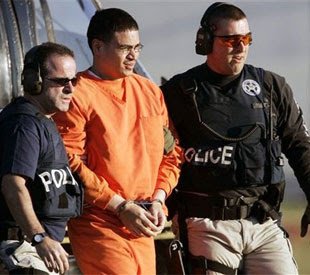 I read with interest the article by greg krikorian in column one of today's latimes. the headline read - "Confronting terror, calmly" and the subheading was, "A top expert draws upon classified data as well as experience. His verdict? The threat is here to stay, but we can cope." fair enough, sounded like it was the kind of thing worth reading and the column one articles tend to be pretty good. past experience and disappointments have made me suspicious of articles about terrorism, but I try to keep an open mind, and regardless of my ability (or lack of it) to do so, I'm always curious to discover what is being written - and published - about terrorism these days.
I read with interest the article by greg krikorian in column one of today's latimes. the headline read - "Confronting terror, calmly" and the subheading was, "A top expert draws upon classified data as well as experience. His verdict? The threat is here to stay, but we can cope." fair enough, sounded like it was the kind of thing worth reading and the column one articles tend to be pretty good. past experience and disappointments have made me suspicious of articles about terrorism, but I try to keep an open mind, and regardless of my ability (or lack of it) to do so, I'm always curious to discover what is being written - and published - about terrorism these days.the first few paragraphs only stoked my skepticism and I prepared myself to be frustrated and disappointed again, but I have to admit that despite the description of brian jenkins - the "top expert" - as having been seasoned in guatemala and vietnam and then having enjoyed a forty year tenure at the rand corporation - all of which set off warning signals with me - he comes off as being a pretty legit and insightful authority on all things terror related. here is a brief excerpt that led me to reconsider my initial suspicion and to read the rest of the article more carefully than I otherwise might have.
I mean, how refreshing is that? - here's an expert on terrorism actually calling for an understanding of terrorist motivation - even going so far as to characterize these motives as "understandable" and discouraging the over simplification of terrorists - the bush/cheney/et al. method - as "wicked and evil" (that's the "evil doers" of innumerable bush speeches).
In some ways, Jenkins knows too much. He is immersed routinely in risk assessments and intelligence reports brimming with the stuff of nightmares. His assessment: "We are not going to end terrorism, not in any future I see."
Yet he exudes calm. His Southern California home -- neither fortress nor bunker -- is in a leafy, accessible neighborhood. He is a relaxed frequent flier, traveling more than 200,000 miles a year, much of it to terrorism conferences or briefings around the world.
And he thinks the country can cope as well.
"During the Cold War both the U.S. and Soviet Union spent a great deal of time and money understanding each other. To a great extent, that spared us from mutual annihilation," Jenkins says.
Similarly, he says, in the war on terrorism "we have to have a better understanding of what we're up against." Demonizing terrorists as "wicked and evil" plays into their hands, while learning about "their quantifiable goals and understandable motives" demystifies them.
Knowledge, he says, is the antidote to anxiety.
so I continued reading optimistically looking for more well reasoned viewpoints. in reference to his first tour in vietnam as a green beret jenkins says,
That first combat tour would provide a valuable lesson, he says, in how not to fight terrorism.
"If in the process of going after terrorists you create terror, then you are going to be in conflict forever," he says. And accepting high levels of "collateral casualties" among the local population is sure to be "a losing strategy."
I absolutely agree. and so, as I read on I was more certain that the article would continue in this vein, but (not surprisingly I suppose) I was disappointed. no solutions or answers were forthcoming. what the article seemed on the verge of depicting was a new insight which I'm still yet to see printed - and that is that terrorism is simply a method (a weapon, if you prefer) that will continue to be used as long as circumstances lend themselves to that use. and if we are to minimize it or maybe even ultimately overcome it to a significant degree then we must work towards the eradication of the motivations behind it.
some month ago, curious about just what constitutes terrorism, I looked online for definitions. it turns out that in the realm of description, that for terrorism is somewhat evasive. I came across the wikipedia article headed "terrorism" which then led me to the article headed "definition of terrorism" - (as an aside, I just went back to these articles to review the information, and noticed that in the first of the two(the one headed just "terrorism", brian jenkins is quoted in reference to the subjectivity involved in applying the "terrorist" label) - the passage that stuck with me from that intial reading is this;
"As terrorism ultimately involves the use or threat of violence with the aim of creating fear not only to the victims but among a wide audience, it is fear which distinguishes terrorism from both conventional and guerrilla warfare. While both conventional military forces may engage in psychological warfare and guerrilla forces may engage in acts of terror and other forms of propaganda, they both aim at military victory. Terrorism on the other hand aims to achieve political or other goals, when direct military victory is not possible. This has resulted in some social scientists referring to guerrilla warfare as the "weapon of the weak" and terrorism as the "weapon of the weakest."I think that too often the implications of this rather apt, I think, description go unheeded. terrorism it says, is the "weapon of the weakest" to me this suggests an obvious cause and an equally obvious solution. if one wants to limit or do away with terrorism, one must remove the circumstances that drive it, and the circumstances are essentially that terrorism is resorted to when all other options are absent. if we continue to deny voice to political and religious factions and give them no other method of being heard while we at the same time insistently (persistently?) impose our will upon them, then they will inevitably resort to terrorism as a last resort and tragic way of being heard. the wikipedia article on terrorism includes a list of causes of terrorism, which essentially describe situations surrounding those from whom power and opportunity have been taken away. terrorism, it appears, is the weapon of the disenfranchised.
as jenkins, I think sugggests, our methods in the current "war on terrorism" are counter-productive, only serving to exacerbate the problem - it is possible that that is not his viewpoint and perhaps I'm mistaken in that supposition because the article doesn't attribute that sentiment to him, nevertheless it seems implicit in some of his statements I've read both in this latimes article and elsewhere.
I'm pleased to see this article appear, but discouraged that it didn't follow its implications to these apparent conclusions. our "global war on terror is nothing more than a politically motivated tool designed to give us an excuse to exert our will on less powerful states and fuel our military driven economy. it does nothing at all towards achieving its purported goal of combatting terrorism - in fact it clearly promotes terrorist activity and encourages its continuance by playing into the hands of the very individuals and groups we claim to be struggling against. if this is as clear as it is to me, it must be clear to at least some of the people calling the shots, and I can only assume that that means the overcoming of terrorism is not the primary goal of our administration, anymore than the capturing of osama bin laden is - in fact, I fear that, the administration actually sees an advantage to promoting terrorism, as it gives them a much needed enemy in its effort to pour funds into our military - and for that matter, having osama bin laden at large as the "face of that enemy" is much more valuable than having him dead or behind bars.
we have fallen for this myth of terrorism and have created our enemy where there was none... and we continue to do so. if we want to end terrorism we must seek to end poverty and hunger and political and religious disenfranchisement. but alas, ending terrorism is not what this is all about, nor has it ever been.
the only way to end the war on terrorism is simply to declare it over, which incidentally would go a long way towards ending terrorism, as long as we continue to focus so heavily on terrorism, glorifying it and making it a viable weapon it will continue, and as long as we continue to exert our will on others and gain our wealth from their deprivation, terrorism will continue to exist.
and by the way, we are the victims of terrorism primarily because our leaders and our media have instilled the fear of terrorism in us - out of all proportion to its actual existence. in relation to all of the other potential dangers facing us as mortal human beings, the threat of terrorism is so miniscule as to be essentially non-existent, and that is why I say in addition to - don't believe the fear mongers - THERE IS NO TERRORIST THREAT!




